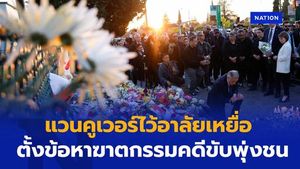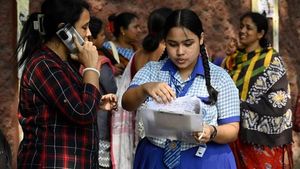In a storm of controversy, former England international Eni Aluko has found herself at the center of a heated debate regarding the role of male pundits in women's football, particularly focusing on Arsenal legend Ian Wright. Aluko's recent comments on BBC Radio 4's Woman's Hour suggested that Wright's prominent presence in women's football broadcasting could be blocking opportunities for female pundits, igniting a backlash from fans and industry insiders alike.
During her appearance, Aluko stated, "I think he’s aware of just how much he’s doing in the women’s game. I think he should be aware of that," emphasizing her belief that there are limited spaces available for female voices in the sport. She argued that if there were equal opportunities for broadcasters in the men's game, it would be a different scenario, but that is not the case. "I can’t dominate the men’s game in the way that, you know, you used Ian as an example," she added, suggesting a disparity in opportunities between the genders.
Aluko's comments have sparked serious discussions within ITV, where she works as a pundit. Reports indicate that executives at the network are reportedly "angry and bemused" by her claims, given their commitment to promoting female talent in sports broadcasting. An insider described Aluko's assertion that Wright is dominating women's punditry as "not only factually incorrect, but deeply disrespectful," especially considering Wright's long-standing support for women's football.
Wright, known for his advocacy of the women's game, has been actively involved in promoting female coaching at grassroots levels and has been an outspoken supporter of equal access to sports for girls. His efforts extend beyond broadcasting, as he has also been seen discussing women's football on his podcast with fellow footballer Steph Houghton and on various television platforms. The article highlights that male allies like Wright are crucial for the growth of women's football, and his involvement should be embraced rather than criticized.
Despite the backlash, Aluko has not retracted her statements. She insists that while she respects Wright's broadcasting skills, there needs to be awareness among male pundits regarding their impact on the opportunities available for women in the industry. "It’s still new, it’s still growing. There’s a finite amount of opportunities and I think that men need to be aware of that," she reiterated during her radio appearance.
The situation escalated further when it was reported that Aluko might be facing termination from ITV due to her comments. Sources close to the network have indicated that her remarks have upset many in the broadcasting community, leading to serious discussions about her future at the company. "Aluko is on very thin ice; the comments she made were ill-judged to say the least," a source revealed.
Adding to the complexity of the situation, Wright has previously shown support for Aluko during challenging times, notably when she faced ridicule for a mistake during the 2022 Qatar World Cup. He publicly defended her, stating, "You man are so pressed by women in football that you take pure pleasure in this. Grow up," in response to online trolling directed at her.
In a further demonstration of his commitment to women's football, Wright has been financially supporting Stoke City defender Kayleigh McDonald, who suffered a ruptured ACL. Reports indicate that Wright has been covering McDonald's rehab costs, amounting to £1,700 per month, after the club refused to pay. McDonald expressed her gratitude on social media, stating, "Forever grateful for everything Ian Wright has done & continues to do for me. I’d of been left with 6 months of rehab to try & fund if it wasn’t for his support." This act of kindness underscores Wright's dedication to supporting women's football and its players.
As the debate continues, the broader implications of Aluko's comments on the media landscape surrounding women's football are being scrutinized. Many in the football community are questioning the validity of her claims, especially given the positive strides made in recent years towards gender equality in sports broadcasting.
Ultimately, the conversation about representation and opportunities in women's football broadcasting is vital. While Aluko's intentions may stem from a desire to advocate for female pundits, the backlash against her comments highlights the complexities of navigating these discussions in a sport that is still evolving.
As the situation develops, both Aluko and Wright remain central figures in a narrative that explores the intersections of gender, opportunity, and advocacy in sports. The outcome of this controversy could have lasting effects on how women's football is covered and who gets to speak on its behalf.





